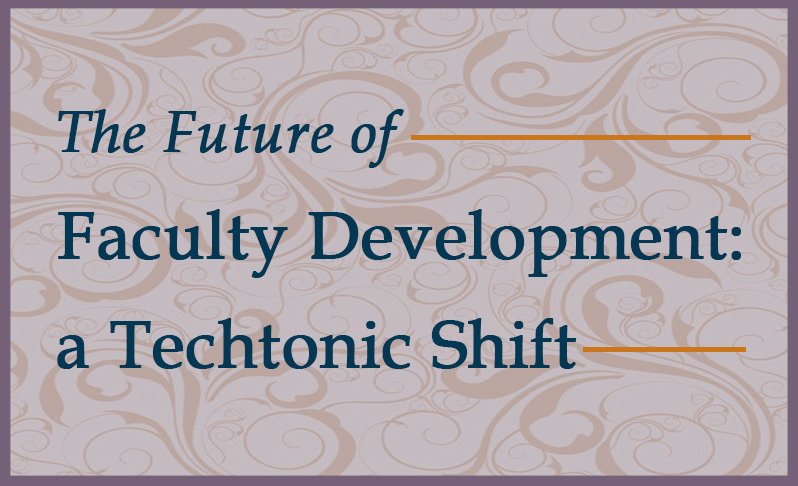In “Preparing New Faculty for Leadership: Understanding and Addressing Needs (To Improve the Academy 33.1, September 2014, 57-73), Kelsch and Hawthorne point out how little new faculty “felt they knew about higher education beyond their discipline” (60). Sorcinelli et al suggest another reason faculty need professional development: they “will need to learn new skills or expand into new areas—new approaches to teaching, new ways to engage with communities, and new strategies or collaborations to pursue their research” (Creating the Future of Faculty Development: Learning from the past, Understanding the Present, 2006, 167).
In our Teaching Applied Creative Thinking (2013) we suggest a new model for professorial responsibilities that includes mandatory faculty development (146-147). While we believe all these insights and ideas have merit, we’d like to suggest a new delivery system.
Our rationale for this system is based on changing demographics. At our institution we just finished a week of New Faculty Orientation (NFO), and the 62 members of the so-called Class of 2014 represent approximately 10% of the full-time faculty at Eastern Kentucky University. Cumulatively, half of the faculty at our school has turned over in the past five years. Both here and in the national literature we have noticed some trends concerning the higher educators of the 21st century:
- Newer faculty view their profession as a 9:00-5:00 job. (Tweet this quote.) As a result, one change we made in our NFO was starting at 9:00 and finishing by 1:00, creating a family-friendly atmosphere wherein the professors who are also parents (the helicopter phenomenon) can even take their kids to school and pick them up.
- As part of the Millennial Generation, newer faculty are very tech savvy. (Tweet this quote.) No doubt the highlight of NFO was not “graduation,” but being given their own laptop (or seeing their comments instantly light up our “Tweet Board”).
- Newer faculty want what they want now. In the non-academic arenas of their lives, newer faculty are used to grabbing their cellphone to make that important call or looking up a needed piece of information instantly on the Internet.
As a result, while we surrender to traditional faculty development for the new faculty’s introduction to our university, and we continue to provide the familiar staples of workshops (e.g., Dee Fink on creating significant learning experiences), lunch-and-learns (e.g., a presentation on the University’s academic integrity policy), and professional learning communities (e.g., gatherings of 5% of the school’s faculty to implement flipping the classroom), we are this year experimenting with new technological forms of faculty development. Admittedly, part of our decision is based on low attendance at the traditional events.
First, we created an online course called “Achieving Excellence in Teaching” that we placed in each new faculty member’s BlackBoard account. If the name of the course sounds familiar, it’s because we adapted the course from our book Achieving Excellence in Teaching (2014). The course revolves around a fundamental and powerful concept, the top ten tips for terrific teaching, and runs the gamut from needed dispositions, to organization, to basic technical competence. The course takes approximately one hour to complete, provides a review and quiz at the end, and even offers successful accomplishers a certificate whenever they need/want the training.
Second, to further appeal to this tech audience, we are in the midst of creating a sort of academic Comcast system on our website www.tlc.eku.edu we call the TEACHER’S TOOLBOX. When it’s complete, this PD on Demand platform will offer our busy, tech-savvy faculty the training in fundamental and powerful concepts for them to develop whenever they need/want the training.
Our first podcast, the one we consider most important, is based on the demographics of the typical EKU student as well as the character traits of the millennial student. One of the most fundamental and powerful concepts in writing, oral communication, and teaching is KNOW THY AUDIENCE, certainly the principle factor behind our techtonic shift, so we thought it best to begin with such a summary of the student population. (Tweet this quote.) How we present this information—i.e., the format of the podcast—we think is the key to a successful product.
And in a future post we’ll analyze what we consider the essential traits of an effective podcast.
Author
 Dr. Russell Carpenter is director of the Noel Studio for Academic Creativity and Program Director of the Minor in Applied Creative Thinking at Eastern Kentucky University. He is also Assistant Professor of English. Dr. Carpenter has published on the topic of creative thinking, among other areas, including two texts by New Forums Press. In addition, he has taught courses in creative thinking in EKU’s Minor in Applied Creative Thinking, which was featured in the New York Times in February 2014. Meet Russell.
Dr. Russell Carpenter is director of the Noel Studio for Academic Creativity and Program Director of the Minor in Applied Creative Thinking at Eastern Kentucky University. He is also Assistant Professor of English. Dr. Carpenter has published on the topic of creative thinking, among other areas, including two texts by New Forums Press. In addition, he has taught courses in creative thinking in EKU’s Minor in Applied Creative Thinking, which was featured in the New York Times in February 2014. Meet Russell.



